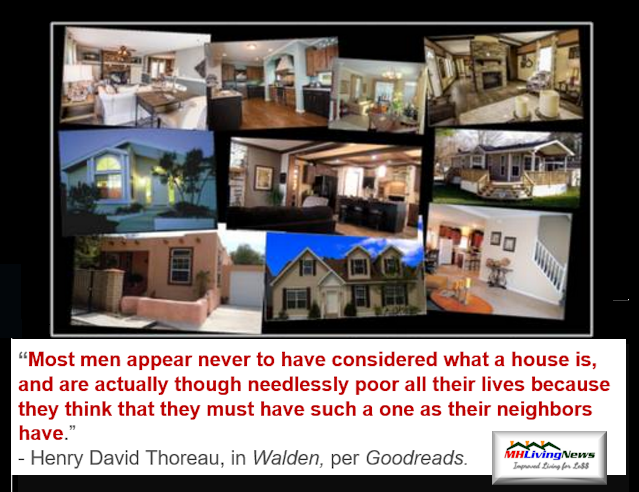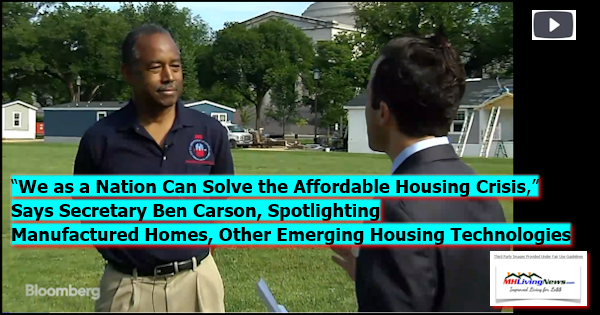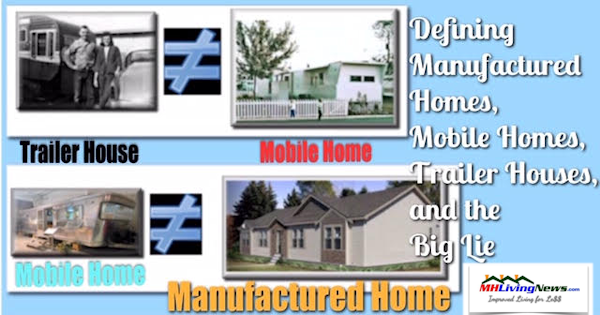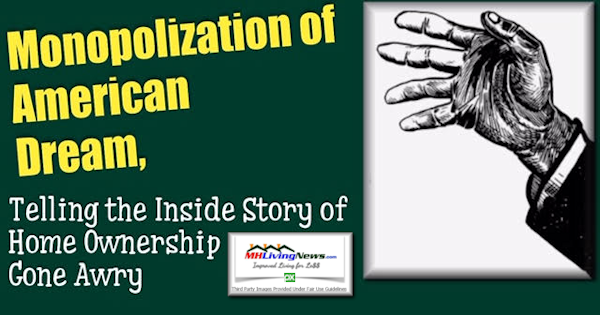Superficially, manufactured housing is an easy to understand product, service, and industry. It costs far more to build a house on site – so-called ‘stick building’ – then it does to build one in a factory and was permanently installed on a buyers preferred home site. It costs more to build apartments than it does a manufactured home community. The clothes you wear, the device you use to read this article, the vehicle you use for transportation, all of those were made in production centers – factories – too. If you built a vehicle in a driveway, it would cost far more and take longer than buying one that was built in a factory and came off an assembly line. Clothes made in a production center is less expensive than tailor-made clothing, and so on.
That principle of mass production saves time, money, and can routinely increase quality applies to many things we use daily, including housing.
Housing in America is a patchwork of regulations that can vary from town to town. A short, true story will serve to illustrate how challenging aspects of the conventional housing industry can be.
While living in Chicagoland and doing a marketing project for a regional manufactured home community operation, a Chicago Sun Times Media Group executive thoughtfully invited my family and myself to their Skybox at “the Cell” to watch a baseball game. Their guests that night were dominated by builders and other housing professionals. To my knowledge, my wife and I were the only professionals from manufactured housing to be invited. A successful site builder we met told me over eats and drinks that he built houses in the Orland and Tinley Park suburbs of Chicago. A major roadway was a dividing line between the too. He colorfully said that on each side of the road, he had to build identical floor plans to a different set of local building standards.
That was crazy, that successful site builder said. It slowed the construction process. It cost home buyers more money. It made no sense. Now, magnify that picture across thousands of cities, towns, and counties in the U.S.
What federally regulated manufactured housing accomplishes is a cure, antidote, and simplification of that real-world scenario.
A factory-builder who constructs a home to the federal standards administered by the Department of Housing and Urban Development (HUD) enjoys a legally mandated preemption of local building codes.
Unlike a modular home, which uses the same prescriptive standards as a site builder has to meet, a manufactured home is a performance-based standard. So long as the home performs in a dynamically similar fashion as a conventional house with respect to energy savings, fire or wind safety, roof-loads and general durability, once a factory is certified by HUD, homes can be built in a variety of unique ways. All HUD Code certified homes will have the benefit of meeting certain ‘minimum’ standards of durability, safety, energy, and construction. Even an ‘entry level’ home will get the benefits to consumers of housing that has strong consumer protections not found in other forms of mainstream housing. While minimum standards exist, as it does for cars or several other costly items, numbers of manufactured home producers build more upscale versions, precisely to attract the more ‘residential’ style home seeker.
So those on the entry level side of the housing market have an opportunity that they may never get in any other form of permanent housing. It was the National Association of Realtors in 2018, not a manufactured housing trade group, that said after an in depth study that manufactured homes offered surprising quality, durability, and safety often at costs that when financed yielded lower monthly payments than renting.
Simplifying HUD’s federal building standards to performance-based cuts through the quilt work of local regulations. It just makes sense. By building indoors in a controlled environment, it yields a savings of time and money. No waiting for subcontractors to show up – or not – at the job site. No waiting for a building inspector to show up – or not – at a job site. Having all of that done in plant, with both federally contracted third-party inspectors plus the factory’s own inspections, offers peace of mind. Add to it consumer safeguards not found in far more expensive housing, and viola! You have a HUD Code certified manufactured homes. No wonder manufactured home owners report a high degree of satisfaction.

The interview video below with Bill Matchneer, the former administrator of the federal HUD Office of Manufactured Housing Programs (OMHP), tells the tale.
Given so much common sense, why aren’t manufactured homes being sold at a record pace? That’s the $64 billion dollar a year question. Let’s look at part of the answer why more homes aren’t being sold.
Removing Barriers, Legally
When the Manufactured Housing Improvement Act (MHIA) of 2000 was passed it included a clause called “enhanced preemption.” That clause was supposed to overcome HUD’s reticence under the original HUD Code passed by Congress in 1974 to preempt local jurisdictions. Federal preemption was already the law. But for various reasons, HUD officials routinely did not follow that mandate. So when the MHIA was passed, it included the specific statement that federal “enhanced preemption” was to be “broadly and liberally construed,” as opposed to narrowly and constrictively, as was the pattern prior to the 2000 law.
The video interview posted above with award-winning, Better Business Bureau (BBB) A+ rated principal Stan Dye of Star Homes in Cullman, AL, explains that about half of his customers first owned a conventionally built house before they did their homework and decided to make their next home a HUD Code manufactured home.

Once you watch that video, notice that Dye spoke about “enhanced preemption” in that interview?
Note too that Dye stated his desire to see HUD Secretary Ben Carson enforce the federal preemption? Hold that thought.
Let’s briefly segue to note that in a highly partisan era in America, we stress time and again that affordable housing ought to be a nonpartisan or bipartisan issue. A house doesn’t ask what skin color, political party, faith, gender, economic background, religious, or other protected groups the person living in it happens to be. A dwelling is color, identity, faith, and party blind, which is what Fair Housing laws say they should be.
That said, for years, professionals of all backgrounds who have studied the issue of manufactured homes have routinely said similar things. There is surprising quality, affordability, and value.
Thus, it is no surprise that former HUD Secretary Julian Castro praised manufactured homes, as the short video above makes plain.
That said, a search of interviews of Castro or others before him while at HUD reflects fewer interviews talking about manufactured housing than one can find for current HUD Secretary Ben Carson, M.D.
The video interview below with Secretary Carson was captured during the Innovative Housing Showcase (IHS) on the National Mall in Washington, D.C. Pay close attention to what Secretary Carson said in that Fox Business interview. He stressed that manufactured homes that are properly installed are resilient to windstorms and that they are more affordable than conventional housing. ‘Resilient and affordable’ are two qualities Dr. Carson stressed among the reasons that local cities, towns, and county officials should embrace manufactured homes instead of discriminating against them. Hold that thought as you watch the video.
What that Fox Business interview suggests in an indirect fashion is frankly and fairly something more significant than Stuart Varney or any mainstream media reporter would normally know.
Few know about the “enhanced preemption” provision of federal law when it comes to manufactured housing. Apparently, if this Fox Business interview is taken at face value, Secretary Carson himself may not have been properly – or at all – briefed on that enhanced preemption aspect of the MHIA law. MHLivingNews has sources on both sides of the political aisle, including ‘inside HUD,’ that have said as much.
Put 5 Stars By This Next Point *****
Rephrased, HUD Secretary Carson has the authority to order local jurisdictions to accept a HUD Code manufactured home – precisely because of “enhanced preemption” (see MHIA section 604(D)) under the updated federal law – instead of pleading with them.
Secretary Carson issuing such an order would in turn would open up affordable housing opportunities nationally.
There are a variety of special interests and NIMBY-minded people who oppose not only manufactured homes but may oppose affordable apartments as opposed to so-called ‘luxury’ apartments. That’s a part of what Congress hoped to avoid by passing the MHIA legislation, which then-President Bill Clinton signed into law.
Full and proper enforcement of that MHIA law would open home ownership opportunities for potentially tens of millions of Americans, via ‘affordable and resilient’ modern manufactured homes. As Secretary Carson has said, that would mean renters would be on the path to wealth creation. Dr. Carson said, in a speech linked here, that the typical renter has only about $5000 net worth, while the typical homeowner has some $200,000 net worth. Because a manufactured home can appreciate, as Carson has also explained, based upon federal data complied by the Federal Housing Finance Agency (FHFA), manufactured homes can be a superior option.
An in-depth interview with factory-built homeowner, the Rev. Donald Tye, Jr. revealed, because a manufactured home costs significantly less, that means it can be paid off more rapidly. That in turn can accelerate the wealth-building prospects for manufactured home owners. Note that in that video interview, in the report linked below, the Rev. Tye also pressed to have Secretary Carson fully implement federal law, including the enhanced preemption provision of the MHIA.

Given such important facts, and with Carson’s stated desire to see a broader use of manufactured homes, why haven’t HUD staff briefed Secretary Carson on that point, as evidence and sources both suggest? What is going on at HUD?
Troubling Facts and Vexing Implications
Another question is teed up by that point. It should be the job of a trade association to inform a public official over favorable aspects of federal law that are not being properly implemented. Businesses join a trade group to advocate for or against pending laws, but also for supporting enforcement of existing laws. So, has that been occurring? Keep in mind that Secretary Carson has addressed two Manufactured Housing Institute (MHI) events. There have been numerous opportunities for that trade group to have asked him to enforce all of the MHIA, including enhanced preemption.
Let’s look at two specific cases at the national level.
The Washington, D.C. based Manufactured Housing Association for Regulatory Reform (MHARR) has raised the issue numerous times with HUD officials and to the industry at large over the years. Until about 2.3 years ago, MHARR had no website of their own. For various reasons, they relied on other trade media outlets to carry their statements and messages. So, when you see the number of times that MHARR has raised the phrase “enhanced preemption” in the past 2 1/3rd years on its own website, the total of number of citations is impressive.

Furthermore, in a letter delivered by FedEx to Secretary Ben Carson, MHARR specifically raised the issue of “enhanced preemption” directly to him. See that letter to Secretary Carson as a download from their site at this link here, because it includes not only the legal references, but also a letter from federal lawmakers that backed up the MHIA preemption claim. In short, MHARR left no room for doubt about their point.
But let’s be blunt. Secretary Carson likely gets tons electronic messages and letters too. Those are routinely reviewed by staff, not the top person. So, what guarantee is there that Carson saw, read, and was briefed on the meaning of that letter?
By contrast, there is the Arlington, VA based Manufactured Housing Institute (MHI). MHI is several times larger than MHARR. They have a bigger budget than MHARR by far. They are also the industry’s self-proclaimed ‘umbrella’ trade group, so they handle both production and post-production issues. Enhanced preemption is a topic properly in the venue of an association that deals with issues after a home leaves the factory (production). So, zoning and placement are ‘post-production’ issues, and are in MHI’s sphere. Further, as noted above, MHI has hosted Secretary Carson and met with him a number of times. Why did MHI fail to make federal preemption a key issue?
By contrast, MHARR has publicly said that they have pressed the MHIA and related placement/preemption issues because MHI has not.
MHARR Launches “Fighting Discriminatory Zoning Mandates” Manufactured Housing Project
As MHLivingNews – and our MHProNews sister site – have previously reported, the evidence suggests that for MHI – for whatever reasons – has obscured a law that they know exists. MHLivingNews laid out a series of evidence, reasoning, and analysis in the link below that makes plain what has NOT been occurring at MHI.

But let’s make this crystal clear. A search of MHI’s own website today indicates no use of that phrase, ‘enhanced preemption.’ Why would they fail to promote something so useful and necessary to the industry, and of potential value to millions of current and potential manufactured homeowners?

MHARR and others of good will in manufactured housing are not only fighting an entrenched bureaucracy, they are de facto arguably battling a foot-dragging MHI too. But why should two manufactured housing trade groups be at odds at all?
That brings us back to the headline.
The evidence suggests that MHI is arguably dominated by Berkshire Hathaway owned brands. Warren Buffett led Berkshire Hathaway on paper could have purchased the entire manufactured home industry in 2003, had antitrust laws allowed that to occur. While not every manufactured home business owner would have wanted to sell, many would have, just as Clayton Homes did.
- That noted, what is a purportedly monopoly-minded shrewd dude like Buffett supposed to do?
- How can you monopolize a market without appearing to federal or state officials to be in violation of various laws?
To the Machiavellian mind, the answer might be simple. Hit the industry where ever a weakness exists, be it finance, image, media, regulation, zoning, or whatever.

The first half of the report linked below tees up a topic, which the last half documenting what attorneys have said appears to be ‘smoking gun’ evidence of antitrust law violations.

Among other things noted in the report linked above and below, is this next point.

Once a major conglomerate weaponizes the largest national trade group – that also happens to be the post-production trade association – an issue like MHI’s failure to promote ‘enhanced preemption’ begins to come into focus with the following motivation understood.
By restricting new manufactured home sales via various debatably artificial means, consolidation of the industry has slowly occurred. Mainstream media have at times decried what Berkshire, Clayton Homes, and their affiliated lenders like 21st Mortgage Corp and Vanderbilt Mortgage and Finance (VMF) have purportedly done. One of several possible examples is found in their own hometown Knoxville news video below.
So, there are a string of stage-managed productions, per informed sources, of posturing behavior by MHI staff to MHI members and those in the industry that ‘buy’ their narrative.
That said, perhaps thousands of industry professionals question or doubt their authenticity. The evidence is that MHProNews has consistently held MHI, Clayton Homes, and the Berkshire brands to account, and the professional audience has overall grown for the past two years, per third party data. Or as outside investors, some media, public officials and others have said who are exploring our industry, there is only one narrative among industry trade media that makes sense. That ‘it fits the facts’ narrative is presented here on MHLivingNews and on our professional business and investor focused sister site.
Which brings us to a development that was made public only last week. After months of digital articles hitting the enhanced preemption theme time and again, MHI has begun a pivot. For those who grasp the above, this is a bombshell change by MHI, as will be revealed, below.
What MHI Recently Sent to HUD Secretary Carson – Why it Matters
Let’s be clear. MHI could have largely stayed in silent denial on enhanced preemption, and that doesn’t change the reality of the law. To be specific, it isn’t as if MHI never spoke about enhanced preemption or other provisions of the MHIA 2000 law. But they did so sparingly. They demonstrably have not been doing so on their own website. In numerous opportunities to make this an issue, MHI demonstrably and arguably sat on their hands.
An effect of that was steady consolidation of the industry into ever fewer ‘big boy’ hands.
So big players at MHI could stay quiet while that consolidation occurred. They might reason that in years to come, when there is not much more to consolidate among independent businesses, that they could then take the foot of the brake pedal and then push good existing laws. At that point, sales of manufactured homes – with full implementation of good federal laws already on the books, such as Duty to Serve manufactured housing lending mandated by the Housing and Economic Recovery Act (HERA) of 2008, Enhanced Preemption, and other provisions already federal law could cause manufactured home sales to soar.
Potentially tens of billions more in sales could be made by doing so. That’s the temptation. That’s the purported motivation. A careful listening to the video interview with Kevin Clayton posted in the last half of the report found at this link here makes several statements entirely in keeping with that rationale.
Which brings us to the following. MHARR for years has periodically raised the issue of the MHIA and the Duty to Serve provisions of federal law, among other points. The objective importance of their stances to current and potential owners of manufactured homes can’t be understated. Nor should the importance of their posture with respect to independents of all kinds be underestimated. That said, MHARR’s mission is technically limited to the advocacy of their factory-producer members. They are going ‘above and beyond’ by tackling issues like zoning, placement, financing, or issues that aren’t strictly speaking factory-regulation focused.
Which must be then put in the larger perspective of the broader industry. Why are other industry trade media so reluctant or completely unwilling to tackle issues that we have on MHLivingNews or on our professional site?
For years, ‘enhanced preemption’ has been an issue here on MHLivingNews and MHProNews, even more so.
But for the past several months as noted above, we’ve amped it up. In doing so, we’ve drawn a straight-line connection between concerns that MHI – for whatever reasons – where dragging their feet on an issue that they should, must, and did in fact knew about.
One example of several possible that MHI knew about the law is a hearing where MHI’s General Counsel and Senior Vice President (SVP) Rick Robinson lightly raised the topic found in a document linked here. But notice it is only a mention? If you don’t look or listen for it, would you miss it? Notice that Robinson doesn’t hammer away at the importance of the law, or what it means?
Robinson’s statement is a passing mention in bullet 5 on page one of Robinson’s prepared remarks. Here is how it was phrased “…pre-emptive federal building…” codes.
Here is the full sentence, “Unlike site built homes, manufactured homes are built almost entirely in a controlled factory environment in accordance with pre-emptive federal building codes administered by the U.S. Department of Housing and Urban Development (commonly referred to as HUD Code).”
Clearly attorney Robinson knew about preemption. Why not use it in its most potent forceful fashion? Do you see the ‘fig leaf’ effect of doing enough to honestly claim they ‘tried,’ but while the topic under discussion ultimately failed, despite a wealth of information that MHI and their general counsel could have brought to bear.
In several cases that MHProNews investigated in the last year, where local cities were planning partial or full bans on manufactured homes, MHI – per local sources – did not weigh in. MHProNews contacted MHI on several occasions, to get their involvement. Nothing. MHLivingNews made it an issue years ago, with the report linked below, written by award-winning journalist Jan Hollingsworth.

With that backdrop, the MHI letter linked below to HUD Secretary Carson was arguably a major pivot. While the letter had problematic aspects to it that won’t be the focus of this report and analysis, the section dealing with enhanced preemption will be quoted below. MHI’s comments is useful precisely because it largely mirrors what MHARR, MHLivingNews, and MHProNews have hammered away at for years.
— From MHI Letter to HUD Secretary Ben Carson —
4.) HUD Must Implement and Enforce its Enhanced Preemption Authority
MHI Proposes that HUD shall issue a revised and updated policy statement regarding the Department’s position concerning preemption and state and local zoning, planning, or development restrictions that either severely limit or outright prohibit manufactured housing.
HUD needs to exercise its preemption authority when local regulatory construction standards and zoning, planning, or development policies adversely affect the placement of quality, affordable manufactured housing. While HUD has pursued individual cases where local jurisdictions have introduced construction and safety standards that are not consistent with the HUD Code or have imposed zoning and planning requirements that exclude HUD-compliant manufactured homes, MHI believes HUD must play a much greater role in this effort and has a congressional mandate to do so. HUD has jurisdictional authority to move beyond case-by case enforcement and take an official policy position opposing state and local regulatory schemes that are inconsistent with Congressional intent.
In 1997, HUD determined it has authority under the MHCSS Act to issue a “Statement of Policy 1997- 1 State and Local Zoning Determinations Involving HUD Code” (the 1997 Policy Statement) that summarizes the Department’s policy position concerning preemption and certain zoning decisions being made by state or local governments.7 Following passage of the Improvement Act in 2000, which significantly strengthened HUD’s preemptive authority, HUD clearly has the authority to make necessary updates to its original policy statement.8
Consequently, MHI recommends that HUD update its 1997 Policy Statement because it was issued after enactment of the MHCSS Act, but before the passage of the Improvement Act, which would remedy issues raised in the following DRCs: 33, 62, 83, 84, 287, 290, 291, 298, and 299. Given that the Improvement Act expanded HUD’s authority, MHI believes it is only appropriate for the Department to update its statement. Further, updating the 1997 Policy Statement would galvanize HUD’s pledge to facilitate the availability of affordable manufactured homes and to increase homeownership for all Americans.9
— End of extended quote from MHI Letter to HUD Secretary Ben Carson —
That might have been written by MHARR’s attorney. It clearly reflects a knowledge of the law. MHLivingNews has other evidence that they knew about this years ago, would occasionally ask to have this enforced by HUD, but failed to do so consistently.
It is the consistent enforcement of federal law that is necessary. Doing so would open up affordable housing opportunities for potentially millions of Americans. More troubling, not doing so has trapped millions in rentals.
The Bottom Line?
It remains to be seen what MHI will do next. Will they, Clayton Homes, and other ‘big boy’ members suddenly begin to promote in a full-throated manner good federal laws that have largely been dormant?
Time will tell.
But during the years of MHI foot-dragging, what that failure to robustly push existing federal laws have purportedly accomplished is that Clayton Homes market share went from some 13 percent of all manufactured home production in 2003 to some 48 or 50 percent of the market share by 2018, depending on what source is considered. It should be noted that Warren Buffett led Berkshire Hathaway’s annual report has obscured the precise total market share, a topic for another day.
Representative Maxine Waters (CA-D) said a few years ago said in a letter that Clayton Homes was a “near monopoly.” Others joined her to investigate Clayton for the Consumer Financial Protection Bureau (CFPB) “unfair, deceptive, or abusive business practices, the allegations raised in the news report are squarely within the Agencies’ authority to investigate and pursue appropriate corrective action.”
What now House Financial Services Committee Chair Maxine Waters said then could easily be turned into a request that the Federal Trade Commission and the Department of Justice antitrust divisions should investigate.
But parallel to that, what also ought to occur is that the U.S. House and the Senate should each hold public hearings. Subpoenas should be issued that call witnesses and demand documents. MHI and Clayton should arguably be among those investigated. The harm caused to millions of Americans should be part of that discussion. The evidence such a hearings could generate could then be turned over to federal agencies and antitrust or other regulatory oversight action could be demanded.
Manufactured housing is far from alone in being ‘monopolized.’ But the monopolization and manipulation of affordable home ownership is near the core of the American Dream. Frustrating that, for whatever greedy reasons, is to be denounced and acted upon with the full force of the law.
To grasp that severity of the potential harm, see the related report “Fear” linked below the byline. Millions are in rentals today, paying too much to rent that could easily be homeowners, often for lower monthly payments.

More on these topics, with added facts, evidence and revelations will be coming in the days ahead. Stay tuned.
Because this Monopolization of the American Dream has arguably cost some – perhaps several – that you know personally real money and harm. Among those harmed, may include you. To learn more, see the “Fear” report below. “We Provide, You Decide.” © ## (Affordable living, news, fact-checks, analysis, and commentary.)

Related Reports:
Click on the hot-linked text-image boxes below to learn more.



 manufacturedhomelivingnews.com Manufactured Home Living News
manufacturedhomelivingnews.com Manufactured Home Living News




































